12.31.24

LeadershipNow 140: December 2024 Compilation

 Here is a selection of Posts from December 2024 that you will want to check out: Here is a selection of Posts from December 2024 that you will want to check out:
See more on  Twitter. Twitter.
* * *  Follow us on Instagram and X for additional leadership and personal development ideas.

 
Posted by Michael McKinney at 07:15 AM
Permalink
| Comments (0)
| LeadershipNow 140
12.27.24

5 Leadership Lessons: Tony Blair on Leadership Essentials

TONY BLAIR wrote a book about leadership in government. However, his practical ideas on leading in the 21st century apply across the board. Leadership, both good and bad, leaves clues for us to study how other leaders have handled problems and challenges common in all leadership situations. On Leadership does just that.
It is the unwise leader who thinks they know everything. Learning from others’ mistakes and successes is the best way to guard against leadership hubris. Below are a selection of Blair’s thoughts on leadership.
 Leaders have the courage not to go with the flow. They speak up when others stay silent. They act when others hesitate. They take the risk, not because they fail to identify it as risk but because they believe a higher purpose means the risk should be taken. The Leader sets out for the people what they need and not simply what they want. Otherwise, the Leader is just a follower. Leaders have the courage not to go with the flow. They speak up when others stay silent. They act when others hesitate. They take the risk, not because they fail to identify it as risk but because they believe a higher purpose means the risk should be taken. The Leader sets out for the people what they need and not simply what they want. Otherwise, the Leader is just a follower.
 If You come across something unpleasant or cruel that has been written about you: DON’T READ IT! If it’s a horrible headline, ignore it. If it’s an awful article, don’t look at it. None of this means that you shouldn’t listen to sensible and serious criticism. You should. You can learn from it. But you won’t learn anything from the stuff that’s vomiting forth, that’s written for clicks, that delights in its nastiness, that takes pleasure in the hope it is inflicting pain. And if you let it get to you, then you have lost, and ‘they’—whoever at any given time ‘they’ may be—have won. Treat the handling of criticism not as about the receiving of a blow, but as the willingness to be knocked down by it. See refusal and defiance as victories. Because they are. If You come across something unpleasant or cruel that has been written about you: DON’T READ IT! If it’s a horrible headline, ignore it. If it’s an awful article, don’t look at it. None of this means that you shouldn’t listen to sensible and serious criticism. You should. You can learn from it. But you won’t learn anything from the stuff that’s vomiting forth, that’s written for clicks, that delights in its nastiness, that takes pleasure in the hope it is inflicting pain. And if you let it get to you, then you have lost, and ‘they’—whoever at any given time ‘they’ may be—have won. Treat the handling of criticism not as about the receiving of a blow, but as the willingness to be knocked down by it. See refusal and defiance as victories. Because they are.
 When things are going really well, that’s the time to worry about what could go really wrong. Hubris, in its most egregious form, combines overbearing arrogance with malevolence. But hubris can also stem as much from ignorance as vice. The sin lies in these characteristics: thinking you know more than you do; a belief that you have the power to affect a situation that you can’t, or at least not in the way you want; an overly exuberant conviction that you can overcome the odds, however much they may be against you; a faith that by sheer force of conviction you can triumph over an embedded reality. When things are going really well, that’s the time to worry about what could go really wrong. Hubris, in its most egregious form, combines overbearing arrogance with malevolence. But hubris can also stem as much from ignorance as vice. The sin lies in these characteristics: thinking you know more than you do; a belief that you have the power to affect a situation that you can’t, or at least not in the way you want; an overly exuberant conviction that you can overcome the odds, however much they may be against you; a faith that by sheer force of conviction you can triumph over an embedded reality.
 Since leaving office, I have met a big swathe of the business community, including, for fundraising purposes, a significant number of billionaires. I have noticed, however, that in some that success has given them a sense of self-belief that makes them think they’re not only good at the thing that made them rich, but smarter than anyone on other things. The political world contains similar offenders. You win great victory or manage to ascend somehow to the top of what the nineteenth-century Conservative prime minister Benjamin Disraeli called “the greasy pole.” You conclude that you’re a genius. You figured it all out. You came through. You beat the rest. You forget that it isn’t only about ability; it is also about circumstance, the door of opportunity opening in a timely manner, the poor quality of the opposition and, of course, luck. Since leaving office, I have met a big swathe of the business community, including, for fundraising purposes, a significant number of billionaires. I have noticed, however, that in some that success has given them a sense of self-belief that makes them think they’re not only good at the thing that made them rich, but smarter than anyone on other things. The political world contains similar offenders. You win great victory or manage to ascend somehow to the top of what the nineteenth-century Conservative prime minister Benjamin Disraeli called “the greasy pole.” You conclude that you’re a genius. You figured it all out. You came through. You beat the rest. You forget that it isn’t only about ability; it is also about circumstance, the door of opportunity opening in a timely manner, the poor quality of the opposition and, of course, luck.
 A Leader should never bear a grudge. Grudges are wasted energy. They are pointless and mentally time-consuming. They are bad for the esteem in which others hold you and in which you hold yourself. They’re also a sure way of converting someone who dislikes you into someone who hates you. Leadership is best exercised when the senses are cold, not hot; calm, not stormy; detached from personal rancor; when the teeth are not grinding or gnashing and the eyes are seeing the whole picture, not the small corner to which they are drawn by irritation or anger. There is nothing wrong with emotion—we’re human. But emotion should not discolour. It should not warp. A Leader should never bear a grudge. Grudges are wasted energy. They are pointless and mentally time-consuming. They are bad for the esteem in which others hold you and in which you hold yourself. They’re also a sure way of converting someone who dislikes you into someone who hates you. Leadership is best exercised when the senses are cold, not hot; calm, not stormy; detached from personal rancor; when the teeth are not grinding or gnashing and the eyes are seeing the whole picture, not the small corner to which they are drawn by irritation or anger. There is nothing wrong with emotion—we’re human. But emotion should not discolour. It should not warp.
* * *  Follow us on Instagram and X for additional leadership and personal development ideas.
* * *


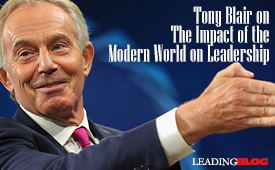 
Posted by Michael McKinney at 09:12 AM
Permalink
| Comments (0)
| Five Lessons
, Leaders
12.26.24

Leading Thoughts for December 26, 2024
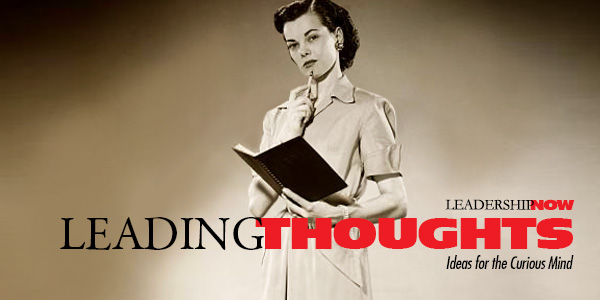
IDEAS shared have the power to expand perspectives, change thinking, and move lives. Here are two ideas for the curious mind to engage with:
I.
Joe Davis on engaging the skeptics:
“Have you ever been in a room, presenting an idea for change, and someone says, ‘Oh, that will never work’? Or you’ve solicited feedback as you work through your options, and you hear the ‘No, we cannot do that’? Your instinct might be to be defensive or just ignore them, but their perspective and experience, if you can embrace it, will strengthen your position. Asking for more information about why they feel the way they do, and then listening carefully to what they say, can be the best course of action.”
Source: The Generous Leader: 7 Ways to Give of Yourself for Everyone’s Gain
II.
Behnam Tabrizi on the challenge to breaking organizational inertia:
“Besides the inertia of size and complexity, human nature is the main obstacle to change. People are conditioned to give away their own power. From being entirely dependent as infants, to partially dependent as we grow into adulthood, we are tempted to continue that pattern. We often abdicate our own thinking to the books we read and the lectures we hear; we leave the dictates of morality to religious leaders and our diet to doctors. Essentially, we’re too afraid to think for ourselves. In the workplace, we’re comfortable ceding our power to the bureaucratic hierarchy so we can settle into a predictable, stable set of routines and tasks.”
Source: Going on Offense: A Leader’s Playbook for Perpetual Innovation
* * *
Look for these ideas every Thursday on the Leading Blog. Find more ideas on the LeadingThoughts index.
* * *  Follow us on Instagram and X for additional leadership and personal development ideas.

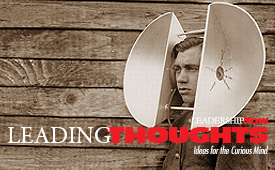 
Posted by Michael McKinney at 12:42 PM
Permalink
| Comments (0)
| Leading Thoughts
12.25.24

10 Books You Should Read This Winter 2024

THE WINTER months are the perfect time for a little binge-reading. While I can’t promise that any of the titles suggested are cozy reads, they will get you fired up.
Personally, I would start with Productive Failure and Mindshift. Like The Illusion of Innovation by Elliott Parker, they will get you thinking in new ways and set you up for the others.
Use this list to create your own winter reading plan. Here are ten suggestions to begin the new year intentionally.
 On Leadership: Lessons for the 21st Century by Tony Blair - (September 2024) On Leadership: Lessons for the 21st Century by Tony Blair - (September 2024)
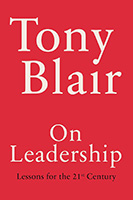 The leadership manual Tony Blair wishes he had when he became prime minister, with personal insights and global examples that show aspiring leaders how to go from talking about change to making change. Sir Tony Blair learnt the precepts of governing the hard way: by leading a country for over ten years. In that time he came to understand that there were certain key characteristics of successful government that he wished he had known when he started. Now Sir Tony has written the manual on political leadership that he would have wanted back in 1997, sharing the insights he has gained from his personal experience and from observing other world leaders at first hand, both while he was in office and since, through his Institute’s work with political leaders and governments globally. The leadership manual Tony Blair wishes he had when he became prime minister, with personal insights and global examples that show aspiring leaders how to go from talking about change to making change. Sir Tony Blair learnt the precepts of governing the hard way: by leading a country for over ten years. In that time he came to understand that there were certain key characteristics of successful government that he wished he had known when he started. Now Sir Tony has written the manual on political leadership that he would have wanted back in 1997, sharing the insights he has gained from his personal experience and from observing other world leaders at first hand, both while he was in office and since, through his Institute’s work with political leaders and governments globally.

 Mindshift: Ignite Change, Inspire Action, and Innovate for a Better Tomorrow by Brian Solis - (October 2024) Mindshift: Ignite Change, Inspire Action, and Innovate for a Better Tomorrow by Brian Solis - (October 2024)
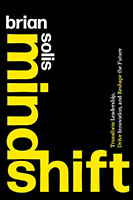 Every company needs leaders who can spot and seize on opportunities at a moment’s notice. Every organization needs leaders who can rally teams together around new opportunities. Those who can see important, emerging trends foresee the coming disruption and harness those forces, translate them into actionable insights and motivation to fuel their company’s march into the future rather than ignoring or running or hiding from opportunities. In Mindshift Brian Solis draws on his experience of leading initiatives that drive innovation and business transformation to deliver the empowering message that this is the time to change the world for the better. And that change starts with you. In this book, you’ll discover why legacy leadership continues to miss the mark and fail to adequately account for change and innovation, causing people to miss the winds of opportunity or threats of disruption until it’s too late. Let this inspire, not frustrate you. Every company needs leaders who can spot and seize on opportunities at a moment’s notice. Every organization needs leaders who can rally teams together around new opportunities. Those who can see important, emerging trends foresee the coming disruption and harness those forces, translate them into actionable insights and motivation to fuel their company’s march into the future rather than ignoring or running or hiding from opportunities. In Mindshift Brian Solis draws on his experience of leading initiatives that drive innovation and business transformation to deliver the empowering message that this is the time to change the world for the better. And that change starts with you. In this book, you’ll discover why legacy leadership continues to miss the mark and fail to adequately account for change and innovation, causing people to miss the winds of opportunity or threats of disruption until it’s too late. Let this inspire, not frustrate you.

 Productive Failure: Unlocking Deeper Learning Through the Science of Failing by Manu Kapur - (October 2024) Productive Failure: Unlocking Deeper Learning Through the Science of Failing by Manu Kapur - (October 2024)
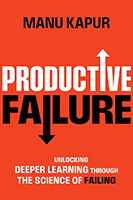 Written by a leading global expert on human cognition, productive failure, and learning methods, Productive Failure shows you how to design the experience of failing. Research shows that repeated experiences of intriguing, constructive failure can help students (and our own children, and anyone else we lead) develop creativity and learn more deeply. When carefully curated, failure can become a signal for learning, not the noise detracting from it. The result? Learners gain a lifelong readiness to push themselves outside of their comfort zones, using setbacks as launchpads for learning and innovation. The evidence-based principles in this book are powerful, not only in formal schooling contexts, but also for anyone taking charge of and designing their own lifelong learning. Written by a leading global expert on human cognition, productive failure, and learning methods, Productive Failure shows you how to design the experience of failing. Research shows that repeated experiences of intriguing, constructive failure can help students (and our own children, and anyone else we lead) develop creativity and learn more deeply. When carefully curated, failure can become a signal for learning, not the noise detracting from it. The result? Learners gain a lifelong readiness to push themselves outside of their comfort zones, using setbacks as launchpads for learning and innovation. The evidence-based principles in this book are powerful, not only in formal schooling contexts, but also for anyone taking charge of and designing their own lifelong learning.

 Revenge of the Tipping Point: Overstories, Superspreaders, and the Rise of Social Engineering by Malcolm Gladwell - (October 2024) Revenge of the Tipping Point: Overstories, Superspreaders, and the Rise of Social Engineering by Malcolm Gladwell - (October 2024)
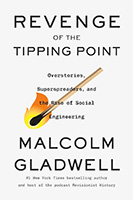 Twenty-five years after the publication of his groundbreaking first book, Malcolm Gladwell returns with a brand-new volume that reframes the lessons of The Tipping Point in a startling and revealing light. Through a series of riveting stories, Gladwell traces the rise of a new and troubling form of social engineering. He takes us to the streets of Los Angeles to meet the world’s most successful bank robbers, rediscovers a forgotten television show from the 1970s that changed the world, visits the site of a historic experiment on a tiny cul-de-sac in northern California, and offers an alternate history of two of the biggest epidemics of our day: COVID and the opioid crisis. Revenge of the Tipping Point is Gladwell’s most personal book yet. With his characteristic mix of storytelling and social science, he offers a guide to making sense of the contagions of modern world. It’s time we took tipping points seriously. Twenty-five years after the publication of his groundbreaking first book, Malcolm Gladwell returns with a brand-new volume that reframes the lessons of The Tipping Point in a startling and revealing light. Through a series of riveting stories, Gladwell traces the rise of a new and troubling form of social engineering. He takes us to the streets of Los Angeles to meet the world’s most successful bank robbers, rediscovers a forgotten television show from the 1970s that changed the world, visits the site of a historic experiment on a tiny cul-de-sac in northern California, and offers an alternate history of two of the biggest epidemics of our day: COVID and the opioid crisis. Revenge of the Tipping Point is Gladwell’s most personal book yet. With his characteristic mix of storytelling and social science, he offers a guide to making sense of the contagions of modern world. It’s time we took tipping points seriously.

 The Power of Culture: An Economist Edge Book (The Economist Edge Series) by Laura Hamill - (November 2024) The Power of Culture: An Economist Edge Book (The Economist Edge Series) by Laura Hamill - (November 2024)
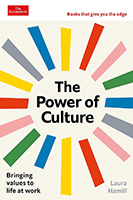 A revelatory new book showing how organizations need to be proactive about their culture—and how they can achieve that vital goal. Organizational culture, though, can be a tricky thing to understand and master. The Power of Culture tackles this head-on, exploring what culture is, and why it matters; how it needs to be aligned with strategy and values; and how to understand it, change it, and make it a reality. Told through real stories and examples and using the author's Intentional Culture Circle as a guide, this new book helps everyone at work to be more aware of culture and how to find opportunities to use it for growth and success. A revelatory new book showing how organizations need to be proactive about their culture—and how they can achieve that vital goal. Organizational culture, though, can be a tricky thing to understand and master. The Power of Culture tackles this head-on, exploring what culture is, and why it matters; how it needs to be aligned with strategy and values; and how to understand it, change it, and make it a reality. Told through real stories and examples and using the author's Intentional Culture Circle as a guide, this new book helps everyone at work to be more aware of culture and how to find opportunities to use it for growth and success.

 Reset: How to Change What's Not Working by Dan Heath - (January 2025) Reset: How to Change What's Not Working by Dan Heath - (January 2025)
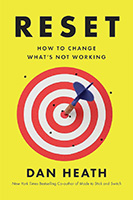 Changing how we work can feel overwhelming. Like trying to budge an enormous boulder. We’re stifled by the gravity of the way we’ve always done things. And we spend so much time fighting fires—and fighting colleagues—that we lack the energy to shift direction. But with the right strategy, we can move the boulder. In Reset, Heath explores a framework for getting unstuck and making the changes that matter. The secret is to find “leverage points”: places where a little bit of effort can yield a disproportionate return. Then, we can thoughtfully rearrange our resources to push on those points. The book investigates mysteries: Why the middle is the roughest part of a change effort. Why inefficiency can sometimes accelerate progress. Why getting “buy-in” is the wrong way to think about change. Changing how we work can feel overwhelming. Like trying to budge an enormous boulder. We’re stifled by the gravity of the way we’ve always done things. And we spend so much time fighting fires—and fighting colleagues—that we lack the energy to shift direction. But with the right strategy, we can move the boulder. In Reset, Heath explores a framework for getting unstuck and making the changes that matter. The secret is to find “leverage points”: places where a little bit of effort can yield a disproportionate return. Then, we can thoughtfully rearrange our resources to push on those points. The book investigates mysteries: Why the middle is the roughest part of a change effort. Why inefficiency can sometimes accelerate progress. Why getting “buy-in” is the wrong way to think about change.

 Essential: How Distributed Teams, Generative AI, and Global Shifts Are Creating a New Human-Powered Leadership by Christie Smith and Kelly Monahan - (January 2025) Essential: How Distributed Teams, Generative AI, and Global Shifts Are Creating a New Human-Powered Leadership by Christie Smith and Kelly Monahan - (January 2025)
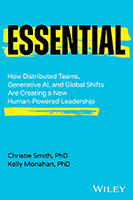 In an era where the foundational elements of business are being disrupted, Essential: How Distributed Teams, Generative AI, and Global Shifts are Creating a New Human-Powered Leadership emerges as a crucial guide for leaders navigating the profound changes reshaping industries and markets worldwide. Whether you're looking to redefine your leadership approach, adapt to the transformed market, or leave a lasting legacy, this book offers a compelling case for why now is the time for a leadership reinvention. Dive into this essential resource and begin your journey towards leading with greater impact and humanity in the business world of today and tomorrow. In an era where the foundational elements of business are being disrupted, Essential: How Distributed Teams, Generative AI, and Global Shifts are Creating a New Human-Powered Leadership emerges as a crucial guide for leaders navigating the profound changes reshaping industries and markets worldwide. Whether you're looking to redefine your leadership approach, adapt to the transformed market, or leave a lasting legacy, this book offers a compelling case for why now is the time for a leadership reinvention. Dive into this essential resource and begin your journey towards leading with greater impact and humanity in the business world of today and tomorrow.

 Inspire: The Universal Path for Leading Yourself and Others by Adam Galinsky - (January 2025) Inspire: The Universal Path for Leading Yourself and Others by Adam Galinsky - (January 2025)
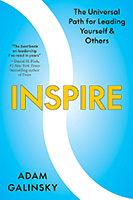 Two kinds of leaders populate the world: those who inspire and those who infuriate. Which will you be? Whether you’re a leader, a member of a team, a spouse, or a parent, this engaging and rigorous exploration unpacks the science of inspiration. Through compelling stories, fascinating research, and practical tips for addressing the common dilemmas we face daily, Inspire reveals how all of us, regardless of status or circumstance, can be more inspiring more often. Social psychologist Adam Galinsky shows how inspiring leaders can fill us with a wellspring of hope and possibility as they guide us to become better versions of ourselves. In contrast, infuriating leaders disappoint and annoy, fueling seething cauldrons of rage. But both types of leaders are deeply connected—together, they represent a universal continuum that is rooted in the very architecture of the human brain. This means that inspiring leaders aren’t born—instead, we can inspire or infuriate in any given moment through our behavior, words, or presence. Two kinds of leaders populate the world: those who inspire and those who infuriate. Which will you be? Whether you’re a leader, a member of a team, a spouse, or a parent, this engaging and rigorous exploration unpacks the science of inspiration. Through compelling stories, fascinating research, and practical tips for addressing the common dilemmas we face daily, Inspire reveals how all of us, regardless of status or circumstance, can be more inspiring more often. Social psychologist Adam Galinsky shows how inspiring leaders can fill us with a wellspring of hope and possibility as they guide us to become better versions of ourselves. In contrast, infuriating leaders disappoint and annoy, fueling seething cauldrons of rage. But both types of leaders are deeply connected—together, they represent a universal continuum that is rooted in the very architecture of the human brain. This means that inspiring leaders aren’t born—instead, we can inspire or infuriate in any given moment through our behavior, words, or presence.

 Employment Is Dead: How Disruptive Technologies Are Revolutionizing the Way We Work by Deborah Perry Piscione and Josh Drean - (January 2025) Employment Is Dead: How Disruptive Technologies Are Revolutionizing the Way We Work by Deborah Perry Piscione and Josh Drean - (January 2025)
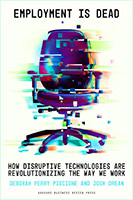 With disruptive technologies on the horizon, traditional employment models are becoming outdated. How will your organization adapt to the evolving landscape of work? Business is on the cusp of a profound transformation. Conventional work models are failing to adapt to the evolving needs and expectations of the modern workforce. Simultaneously, the emergence of disruptive technologies such as artificial intelligence, coupled with web3 innovations, including the metaverse and decentralized work models, is unlocking a new realm of possibilities. It raises the question: Is the era of traditional employment over? With disruptive technologies on the horizon, traditional employment models are becoming outdated. How will your organization adapt to the evolving landscape of work? Business is on the cusp of a profound transformation. Conventional work models are failing to adapt to the evolving needs and expectations of the modern workforce. Simultaneously, the emergence of disruptive technologies such as artificial intelligence, coupled with web3 innovations, including the metaverse and decentralized work models, is unlocking a new realm of possibilities. It raises the question: Is the era of traditional employment over?

 Rethinking Work: Seismic Changes in the Where, When, and Why Rethinking Work: Seismic Changes in the Where, When, and Why
Rishad Tobaccowala - (February 2024)
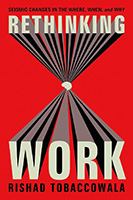 A sea change is occurring—a change so monumental that it is making us re-invent the traditional ideas of where work is done, when work is done, why work is done, and even what work itself is. We have a choice. We can either be reactive and struggle to adjust to transformational events on the fly, or we can be proactive and control the narrative—reinventing work to align with the evolving environment. Schools, banks, law firms, startups, medical offices—every sector will be affected by the current or soon-to-be-emerging trends and events that Rishad describes in this invaluable guide. Learn to thrive in a world where the who, what, why, where, when and how of work will be transformed: Who will people work for? What will organizations look like? Why will people work? Where will people work? When will people work? How will leadership change? A sea change is occurring—a change so monumental that it is making us re-invent the traditional ideas of where work is done, when work is done, why work is done, and even what work itself is. We have a choice. We can either be reactive and struggle to adjust to transformational events on the fly, or we can be proactive and control the narrative—reinventing work to align with the evolving environment. Schools, banks, law firms, startups, medical offices—every sector will be affected by the current or soon-to-be-emerging trends and events that Rishad describes in this invaluable guide. Learn to thrive in a world where the who, what, why, where, when and how of work will be transformed: Who will people work for? What will organizations look like? Why will people work? Where will people work? When will people work? How will leadership change?

* * *  Follow us on Instagram and Twitter for additional leadership and personal development ideas.

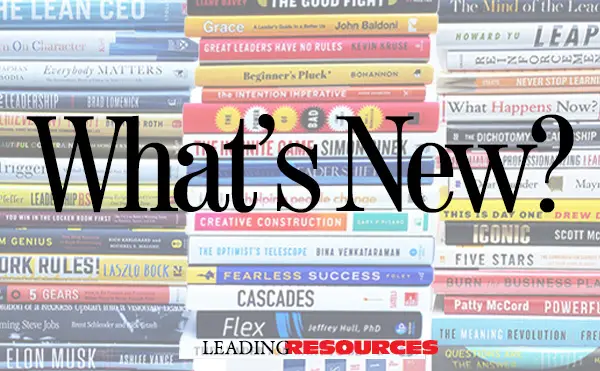 
Posted by Michael McKinney at 12:38 PM
Permalink
| Comments (0)
| Books
12.20.24

Be Powerful & Em-Powerful!
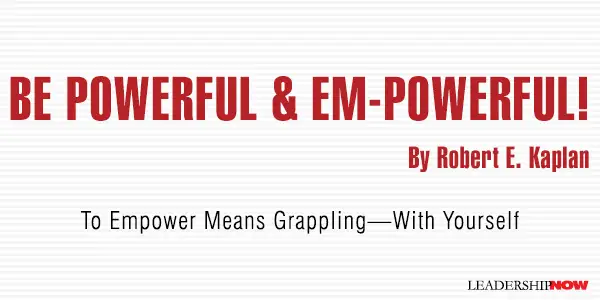
EMPOWERMENT has turned into a buzzword that’s lost its meaning. We all know what being powerful—or, euphemistically, influential—looks like. But to be empowering—how clear is that?
Worse than unclear, empowering is widely misunderstood. For forceful leaders, it’s seen as giving power away; giving power to your staff means giving up your power. It’s easy for forceful leaders to feel that granting power to others takes away from their own power or that they are somehow rendered “passive,” as one forceful leader put it.
Power is simply a means to the end of getting things done. It shouldn’t matter whether it’s your power or “Other” power. You can grind grain into flour by your own hand using a mortar and pestle, which human beings learned to do at the dawn of agriculture. Or, as people discovered centuries later, you can spare yourself that manual labor and produce a lot more grain if you hitch horses or water or wind power to the mill.
Three Types of Empowerment
#1. Delegation. Delegation of authority is letting your people do their jobs. Delegation of authority is certainly not abdication. It’s taking an active role in arranging for some other source of power to be transmitted to the grinding stone. It is spooling out authority and then staying engaged to the degree necessary.
#2. Taking counsel. Empowerment isn’t just granting power down. It’s also accepting power up. Because every leader is fallible—at risk of making costly errors of judgment—there is great merit in taking counsel from your people, selectively, of course.
Perhaps your ego rebels just a bit, and you can’t help feeling that taking your team’s counsel on decisions that are yours to make is somehow a sign of weakness. Quite the contrary, within bounds, accepting power up actually extends your personal power. Done well, it fortifies your judgment—makes it stronger.
#3. Picking strong players. To tap effectively into Other power, you must put strong, capable people on your team in the first place. You can only be as em-powerful as your people’s skills and energies allow. If you were deciding on a place to build a windmill, you’d settle for nothing less than a consistently windy place.
Many leaders fail to put high-quality people on their team. Either they are poor judges of talent or, out of insecurity, they shy away from appointing the best people. Leaders may also fall down on the back end of staffing out of misplaced loyalty or being afraid to let go of people who’ve lost effectiveness or who turn out not to be good picks.
To Empower Means Grappling—With Yourself
Do you recoil at the idea of sharing power, thinking, “Never. I’d be a wimp?” Indeed, empowerment is sometimes viewed as “soft” and, therefore, something to be avoided if you want to be a strong leader and you want to be viewed that way.
If that’s what you believe, you’ll never be good at empowerment. Likewise, if you fear that empowering others makes you a managerial weakling.
That prejudice, that fear, stands in your way. To get it out of the way means grappling with yourself because it isn’t always easy to correct an entrenched belief or allay an unwarranted fear. Why not see your way clear to be both powerful and empowerful? It’s a struggle with yourself well worth waging. (For more on that subject, see my new book, GRAPPLING: Leaders Striving To Be Better, short stories that bring executive coaching to life.)
Why not have both sources of power fully available to you, direct and indirect power. However naturally powerful you are—however well you take charge, make decisions in a timely way, set high expectations, and hold people accountable—it pays big-time to also be em-powerful. That way, you extend your power and amplify your impact. What’s more, you afford other people the opportunity for one of life’s deepest satisfactions—to use their powers fully.
* * *Bob Kaplan is the author of GRAPPLING: Leaders Striving To Improve, a series of short stories that bring executive coaching to life. His unique style is both entertaining and offers a novel way of learning about leadership and self-improvement. The book is based on his decades of experience consulting CEOs and other senior leaders, including founders. He is the founder and president of his own leadership consulting firm, Kaplan DeVries. He invented a 360 survey, the Leadership Versatility Index, that earned a patent for its unique way of assessing leaders. He and his colleagues also take a unique approach to delivering feedback. They place unusually heavy emphasis on positive feedback—as a chance to boost the leader’s confidence. His last book was Fear Your Strengths: What You’re Best Could Be Your Biggest Problem. An honorary senior fellow at the Center for Creative Leadership, he has a B.A. and Ph.D. from Yale University. He lives in New York City with his wife, Becky. You can reach him at bobkaplan@kaplandevries.com
* * *  Follow us on Instagram and X for additional leadership and personal development ideas.
* * *


 
Posted by Michael McKinney at 08:29 AM
Permalink
| Comments (0)
| Management
12.19.24

Leading Thoughts for December 19, 2024

IDEAS shared have the power to expand perspectives, change thinking, and move lives. Here are two ideas for the curious mind to engage with:
I.
Nido Qubein on becoming a transformational leader:
“Our team knows that the highest order of leadership is to tell the truth. Yet, that is just the beginning. You consciously and intentionally have to bring your business, social, spiritual, and family lives together; each plays a part in who you are as a leader. When you do, your life is like a beautiful song. Its harmony influences others, it can move people, and anyone looking at you will know what kind of person you really are.”
Source: Extraordinary Transformation: An Entrepreneurial Blueprint for Leaders Who Seek Transformational Growth in Any Organization Proven Lessons on How a ... and Inspired the Next Generation of Leaders
II.
Manu Kapur on learning and teaching actionable knowledge:
“Experts see different things than novices. Novices tend to see superficial features, but experts see what is essential, the deep structure and critical features. It is seeing the deep structure that leads to understanding and powerful learning. When learning something new, it is much too easy to find the path of least resistance. It is most natural to seek the easy way out. However, making learning easy does not always ease learning. If not intentionally designed to leverage failure in the initial stages, learning tends to be shallow and inflexible. But with it, learning is deep, flexible, and adaptive. Productive Failure suggests that making initial learning more difficult and challenging, where you may struggle and even fail to solve a problem or perform a task, can be beneficial learning.”
Source: Productive Failure: Unlocking Deeper Learning Through the Science of Failing
* * *
Look for these ideas every Thursday on the Leading Blog. Find more ideas on the LeadingThoughts index.
* * *  Follow us on Instagram and X for additional leadership and personal development ideas.

 
Posted by Michael McKinney at 01:11 PM
Permalink
| Comments (0)
| Leading Thoughts
12.16.24

The Wisdom of Charles Handy
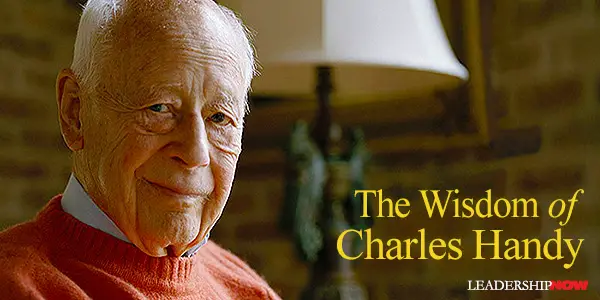
SOCIAL philosopher Charles Handy died at 92 on December 13, 2024. He specialized in organizational behavior and management. From his books, The Hungry Spirit, The Age of Unreason, and 21 Letters on Life and Its Challenges are a selection of his wisdom.
Growth does not have to mean more of the same. It can mean better rather than bigger. It can mean leaner or deeper, both of which might improve rather than expand the current position. Businesses can grow more profitable by becoming better, or leaner, or deeper, more concentrated without growing bigger. Bigness, in both business and life, can lead to a lack of focus, too much complexity, and, in the end, too wide a spread to control. We have to know when big is big enough. — The Hungry Spirit
I still find, after all these years, that I need some psychological “stroking” at least once a week, someone to say, “That was great. You really did an excellent job there.” “How then,” I ask managers, “do you think that people in your organizations can survive with one psychological stroke a year, usually combined with some well-intended but critical comment?” Our self-respect is a fragile thing, even if we pretend otherwise—damage it and we cease to listen. — The Hungry Spirit
To be loved, to be held in genuine affection, is the best foundation for learning about oneself. Such love does not have to be uncritical, nor undemanding. In fact, the more demanding and the more exacting in its expectations the better for our learning, provided that the love is synonymous with unconditional positive regard. — The Hungry Spirit
If changing is, as I have argued, only another word for learning, then the theories of learning will also be theories of changing. Those who are always learning are those who can ride the waves of change and who see a changing world as full of opportunities rather than of damages. They are the ones most likely to be the survivors in a time of discontinuity. If you want to be in control of your change, take learning more seriously. — The Age of Unreason
Young people today often start off their working lives in an organization, be it in business, government, or the charity sector. That is sensible, for a time. I see such organizations as the graduate schools for work. They introduce young people to the necessary disciplines of work, the routines and systems, the need to sell as well as produce, the numbers that matter, and the people who can be relied upon. If the organization does not provide the intimacy of a small group and space to use your initiative to make a difference, you should move on, having finished your graduate apprenticeship. Humans are not meant to be machines. — 21 Letters on Life and Its Challenges
Organizations do need to be organized. The flow of work needs to be compartmentalized and people need to know what they are required to do, by when, and to what standard; but that is managing the work, not the individuals. The difference is crucial. If I know what I am meant to be doing and I believe it to be either useful or necessary, I will do it without someone looking over my shoulder. — 21 Letters on Life and Its Challenges
I call that leadership: creating the conditions for good work, choosing the right people and setting them standards of achievement that they can understand, and rewarding them when they meet them. You may say that I am just playing with words — but words describe the world, even the local world of the organization. I now believe that work needs to be organized, that things should be managed, but that people can only be encouraged, inspired, and led. (By things, I mean the buildings, information systems, or anything else physical.) — 21 Letters on Life and Its Challenges
Humans should only be used to do what humans do best: coming together to get things done as sensibly and creatively and effectively as possible. The technology should not try to do what humans do better, and vice versa. — 21 Letters on Life and Its Challenges
* * *  Follow us on Instagram and X for additional leadership and personal development ideas.

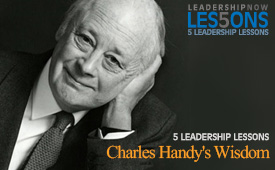 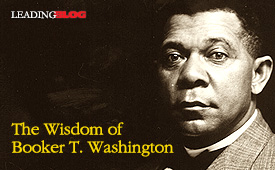
Posted by Michael McKinney at 08:39 AM
Permalink
| Comments (0)
| Leadership
12.13.24

How to Harness Your Top Performers Without Compromising the Whole Team

ONE OF the key questions for executives, business leaders, and entrepreneurs is how to keep raising the bar and ensure a continuous increase in your organization’s success year after year. To me, one of the biggest factors is how you specifically engage and develop your best performers — the ones who make a real difference. One of my clients, Richard, had a standout employee, Stella: at the top of her game, knowledgeable, driven, and skilled at connecting the dots. Hired for a key role in Richard’s organization, she quickly rose to a level of performance above many on her team. Therein lay the challenge.
A Speedy Transformation Ruffles Some Feathers
First, let’s take a look at Stella’s fast trajectory. She went through all four stages of her own evolution as a leader — what I call an Executive Performance Transformation — unusually fast:
- From Day One she was highly drawn to her role.
- She soon became obsessed with performing its tasks to the highest level.
- She then shifted to a mindset of effective decision-making, problem-solving, and delegation, and saw how her work fit within the organization’s bigger picture. As a leader, she was ready for success.
- She was able to ultimately achieve high performance with tremendous self-assurance – almost playfully..
Stella continued to shine, delivering top results confidently and consistently, embracing her own stretch goals, and role-modeling the company’s wider culture. She prioritized appropriately for overall success and was always willing to put in extra effort when needed. Richard saw the enormous value she added to the organization and increasingly involved her in the company’s strategic decision-making, asking for her input more often than he asked others.
It was clear the whole business benefited from Stella’s ideas and achievements — even her team understood that. But she wasn’t always meshing with the team — and other sentiments began to surface as well among her colleagues, including resentment. Some of her fellow team members began to speak up, asking questions like: “Do Stella’s ideas and opinions count more than ours?” “Is Stella getting special treatment?” “Are we being outstripped by Stella?”
Leveling the Team’s Imbalance
As a leader, Richard had a dilemma. On the one hand, he needed to continue to reward and encourage Stella in order to go on harnessing her outstanding contribution. On the other hand, he needed to find a way to defuse her coworkers’ frustration and resentment and change the dynamic to prevent the team from becoming dysfunctional.
In our coaching sessions, we discussed the best approach. It was clear he’d need to take care of both issues at the same time. We also went through some of the possible scenarios and unfavorable messages that he’d be sending out as a leader if he didn’t:
- If Richard chose to ignore the team’s criticism and resentment, the message would be I don’t care about team spirit.
- If Richard put the brakes on Stella, involving her less to avoid the team feeling treated unfairly, the message would be that It’s more important that everyone feels okay than we achieve the maximum success possible.
- If Richard failed to address Stella’s team behaviors, the message would be As long as you, Stella, keep on performing at this level, I don’t care about your impact on the team dynamics.
- If Richard prevented the team from giving feedback and therefore feeling fully included and equally appreciated, the message would be I don’t care about you. Stop whingeing and whining.
Parallel Strategies
Embarking on his parallel approach, Richard started by regularly and explicitly expressing his appreciation and gratitude towards Stella for her exceptional attitude and performance. In this way, he avoided risking that she’d feel her efforts were taken for granted. In addition, he explained that he had the very highest expectations of her when it came to her team behavior. During their biweekly one-on-ones, he made sure to remind her that, as an exceptional performer, she had a major impact on those around her and would always be under intense scrutiny by other team members.
Richard urged Stella to always act as a role model in every respect. In team meetings, for example, he advised her to contribute last, after her colleagues, to prevent them from feeling sidelined or railroaded. And before making her contribution, he suggested she first comment appreciatively on other members’ input: “You made a great point there...”, or “That reminded me of…”
At the same time, Richard addressed the whole team. He organized an offsite session where he pointed out each member’s value to the overall success of the business. He particularly emphasized the team player qualities of each individual. Then he set up one-on-one meetings between every team member, including himself. After well-structured preparation, each team member shared what they valued, especially about the other, what the other could change to achieve even better teamwork, and how they could support each other even more.
On the back of this process, each team member made one personal commitment that would add to the team’s strength. For his own one-on-one with each team member, Richard asked for direct and candid feedback, asking, “Does everybody feel equally appreciated?” “Does everybody get sufficient opportunity to contribute their ideas?” “Does everybody feel fully included?”
Building a Culture of High Performance and Appreciation
Richard’s approach enabled him to continue harnessing Stella’s exceptional performance and potential. At the same time, he established a high-performance culture built on mutual respect, appreciation and support.
The challenge he faced is certainly not uncommon in organizations. As a leader, you may likely experience a similar situation. My recommendation is that you keep aiming high. Harness the exceptional potential of individual star performers while simultaneously cultivating a healthy team culture. It’s a win for everyone.
* * *Dr. Christian Marcolli is a global expert on sustainable high performance who coaches executives, business leaders, market-leading brands, and elite athletes to achieve outstanding results. His firm, Marcolli Executive Excellence, focuses on fostering leadership excellence, driving team effectiveness, and creating organizational health. He’s an in-demand speaker, award-winning author, University of Zurich-trained psychologist, and former pro soccer player. His latest book is Spotlight on Performance: Executive Inspiration, Volume II. Learn more at www.marcolli.com.
* * *  Follow us on Instagram and X for additional leadership and personal development ideas.
* * *


 
Posted by Michael McKinney at 09:17 AM
Permalink
| Comments (0)
| Teamwork
12.12.24

Leading Thoughts for December 12, 2024

IDEAS shared have the power to expand perspectives, change thinking, and move lives. Here are two ideas for the curious mind to engage with:
I.
Terence Mauri on AI and leadership:
“It’s time to question ways of leading that diminish what makes us human. A failure to reimagine how we work is a failure of leadership.
“The more digital we become, the more human we need to be. The reimagination of mindsets, culture, and capabilities in sync with the rise of AI may be the leadership imperative of the twenty-first century.”
Source: The Upside of Disruption: The Path to Leading and Thriving in the Unknown
II.
Morgan Housel on taking the good with the bad:
“People who think about the world in unique ways you like almost certainly think about the world in unique ways you won’t like.”
Source: Same as Ever: A Guide to What Never Changes
* * *
Look for these ideas every Thursday on the Leading Blog. Find more ideas on the LeadingThoughts index.
* * *  Follow us on Instagram and X for additional leadership and personal development ideas.

 
Posted by Michael McKinney at 10:25 AM
Permalink
| Comments (0)
| Leading Thoughts
12.10.24

The Best Leadership Books of 2024
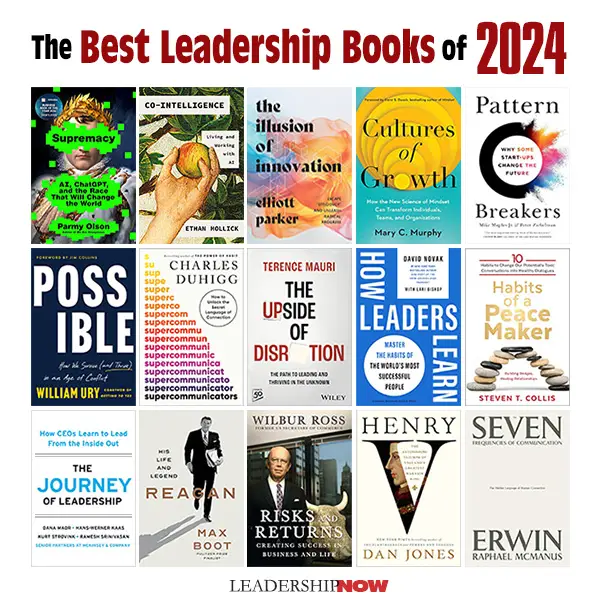
THE titles listed below, published in 2024, improve our self-awareness regarding relationships and communication the sine qua non of leadership and provide us with a wider perspective on innovation and the changes taking place around us.

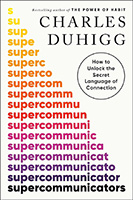 Supercommunicators: How to Unlock the Secret Language of Connection
Supercommunicators: How to Unlock the Secret Language of Connection
by Charles Duhigg
(Random House, 2024)
Come inside a jury room as one juror leads a starkly divided room to consensus. Join a young CIA officer as he recruits a reluctant foreign agent. And sit with an accomplished surgeon as he tries, and fails, to convince yet another cancer patient to opt for the less risky course of treatment. In Supercommunicators, Charles Duhigg blends deep research and his trademark storytelling skills to show how we can all learn to identify and leverage the hidden layers that lurk beneath every conversation. Communication is a superpower, and the best communicators understand that whenever we speak, we're actually participating in one of three conversations: practical (What’s this really about?), emotional (How do we feel?), and social (Who are we?). If you don’t know what kind of conversation you’re having, you’re unlikely to connect. (Blog Post)


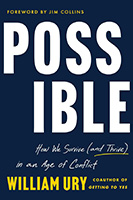 Possible: How We Survive (and Thrive) in an Age of Conflict
Possible: How We Survive (and Thrive) in an Age of Conflict
by William Ury
(Harper Business, 2024)
One of the world’s top experts in the field, Ury has worked on conflicts ranging from boardroom battles to labor strikes, from the US partisan divide to family feuds, from wars in the Middle East, Colombia and Ukraine to helping the US and USSR avoid nuclear disaster. Now, in Possible, he helps us tackle the seemingly intransigent problems facing us. In Possible, Ury argues conflict is natural. In fact, we need more conflict, not less—if we are to grow, change, evolve and solve our problems creatively. While we may not be able to end conflict, we can transform it—unleashing new, unexpected possibilities. (Blog Post)


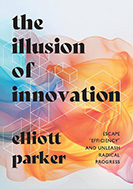 The Illusion of Innovation: Escape "Efficiency" and Unleash Radical Progress
The Illusion of Innovation: Escape "Efficiency" and Unleash Radical Progress
by Elliott Parker
(Ideapress Publishing, 2024)
There's a problem with innovation inside of big companies. And it's not what you think. Corporations are better managed than ever, but they're less capable of delivering the breakthroughs that change our world for the better. Big companies are too often focused on efficiency instead of resiliency. They're optimized for safety and predictability, for maintenance of the status quo. Their focus on capital efficiency leads them to engage in an illusion of innovation: activity that feels like innovation but leads to value destruction, not progress.


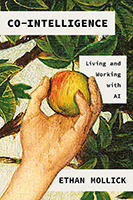 Co-Intelligence: Living and Working with AI
Co-Intelligence: Living and Working with AI
by Ethan Mollick
(Portfolio, 2024)
Something new entered our world in November 2022 — the first general purpose AI that could pass for a human and do the kinds of creative, innovative work that only humans could do previously. Wharton professor Ethan Mollick immediately understood what ChatGPT meant: after millions of years on our own, humans had developed a kind of co-intelligence that could augment, or even replace, human thinking. Through his writing, speaking, and teaching, Mollick has become one of the most prominent and provocative explainers of AI, focusing on the practical aspects of how these new tools for thought can transform our world. In Co-Intelligence, Mollick urges us to engage with AI as co-worker, co-teacher, and coach. He assesses its profound impact on business and education, using dozens of real-time examples of AI in action. Co-Intelligence shows what it means to think and work together with smart machines, and why it's imperative that we master that skill.


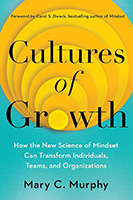 Cultures of Growth: How the New Science of Mindset Can Transform Individuals, Teams, and Organizations
Cultures of Growth: How the New Science of Mindset Can Transform Individuals, Teams, and Organizations
by Mary C. Murphy Ph.D.
(Simon & Schuster, 2024)
In Cultures of Growth, Dweck’s protégé, Mary Murphy, a social psychologist at both Stanford and Indiana University, shows that mindset transcends individuals. A growth mindset culture can transform any group, team, or classroom to reach breakthroughs while also helping each person achieve their potential. Create environments where people want to be, where everyone can thrive and achieve their potential, both individually and together. In a world where success seems reserved for a chosen few, Cultures of Growth unveils a radically different approach to creating organizations that inspire learning, growth, and success at all levels. (Blog Post)


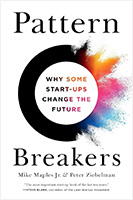 Pattern Breakers: Why Some Start-Ups Change the Future
Pattern Breakers: Why Some Start-Ups Change the Future
by Mike Maples Jr and Peter Ziebelman
(PublicAffairs, 2024)
The breakthrough concepts of Pattern Breakers come from the observations of Mike Maples Jr., a seasoned venture capitalist, who noticed something strange. Start-ups like Twitter, Twitch, and Lyft had achieved extraordinary success despite their disregard for “best practices.” In contrast, other startups deemed highly promising often failed, even when they seemed to do everything right. Pattern-breaking success, they reveal, demands a different mindset and actions to harness developments others miss or that may, at first, seem crazy. Maples and Ziebelman vividly illustrate an unexpected world where chaos is welcome, naysayers are a positive signal, movements galvanize believers—but one that ultimately change the future. They challenge us to rethink how to transcend the ordinary and achieve the extraordinary. (Blog Post)


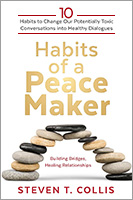 Habits of a Peacemaker: 10 Habits to Change Our Potentially Toxic Conversations into Healthy Dialogues
Habits of a Peacemaker: 10 Habits to Change Our Potentially Toxic Conversations into Healthy Dialogues
by Steven T. Collis
(Shadow Mountain, 2024)
Most people have experienced the slippery slope of dialogue that descends into -polarized argument. We yell at each other. We gaslight. We twist one -another’s words and meanings. We embrace facts that support our conclusions and ignore those that don’t. Or we sit in silence, afraid to discuss anything of substance. If how you treat others matters to you, this book offers powerful new habits that can give you the confidence to engage in dialogue about hard topics while building and strengthening relationships. Steven T. Collis, one of the world’s leading experts on civil -discourse, reveals ten practical habits that can help you navigate the potential minefields of hard topics and leave you and those you converse with feeling thoughtful and productive. (Blog Post)


 The Seven Frequencies of Communication: The Hidden Language of Human Connection
The Seven Frequencies of Communication: The Hidden Language of Human Connection
by Erwin Raphael McManus
(Arena Publishing, 2024)
In The Upside of Disruption renowned disruption thinker and best-selling author Terence Mauri delivers a compelling set of mindset shifts for today's unique leadership challenges. In the book, you'll find the future-ready insights and tools you need to lead for today and prepare your organization for tomorrow. The author explains why so many of us continually overestimate the risks of bold decisions while underestimating the downsides of standing still for too long in an increasingly complex and volatile world. You'll learn about the upside of disruption and how to turn it into a tailwind for laser-like focus and strategic courage. (Blog Post)


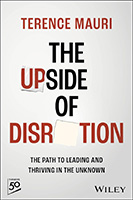 The Upside of Disruption: The Path to Leading and Thriving in the Unknown
The Upside of Disruption: The Path to Leading and Thriving in the Unknown
by Terence Mauri
(Wiley, 2024)
In The Upside of Disruption renowned disruption thinker and best-selling author Terence Mauri delivers a compelling set of mindset shifts for today's unique leadership challenges. In the book, you'll find the future-ready insights and tools you need to lead for today and prepare your organization for tomorrow. The author explains why so many of us continually overestimate the risks of bold decisions while underestimating the downsides of standing still for too long in an increasingly complex and volatile world. You'll learn about the upside of disruption and how to turn it into a tailwind for laser-like focus and strategic courage. (Blog Post)


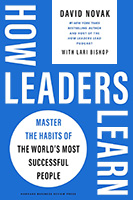 How Leaders Learn: Master the Habits of the World's Most Successful People
How Leaders Learn: Master the Habits of the World's Most Successful People
by David Novak with Lari Bishop
(Harvard Business Review Press, 2024)
When you put learning at the center of everything you do, you grow your career, your leadership, your relationships, and your joy and fulfillment in life. But even for people who are naturally curious and interested in solving problems, being an effective learner who can turn their learning into action takes insight and practice. With infectious enthusiasm and optimism, David Novak shows you how to master active learning. This compilation of wisdom and practical habits from Novak's life and from some of the most successful leaders in the world—CEOs from many industries, military and political leaders, sports greats, experts, and coaches—is your active-learning practice manual. Chapter by chapter, Novak and his all-star roster of leaders share how they've climbed to the highest levels in their fields.


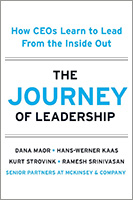 The Journey of Leadership: How CEOs Learn to Lead from the Inside Out
The Journey of Leadership: How CEOs Learn to Lead from the Inside Out
by Dana Maor, Hans-Werner Kaas, Kurt Strovink and Ramesh Srinivasan
(Portfolio, 2024)
When the pressure is on, many of the world’s top CEOs turn to McKinsey & Company to reinvent themselves and their organizations. The Journey of Leadership brings the experience of one of the world’s most influential consulting firms right to your fingertips. This book is the first-ever explanation of McKinsey’s step-by-step approach to transforming leaders both professionally and personally, including revealing lessons from its legendary CEO leadership program, The Bower Forum, which has counseled more than five hundred global CEOs over the past decade. It is a journey that helps leaders hone the psychological, emotional, and, ultimately, human attributes that result in success in today’s most demanding top job.


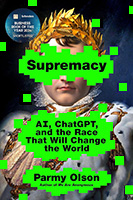 Supremacy: AI, ChatGPT, and the Race that Will Change the World
Supremacy: AI, ChatGPT, and the Race that Will Change the World
by Parmy Olson
(St. Martin's Press, 2024)
In November of 2022, a webpage was posted online with a simple text box. It was an AI chatbot called ChatGPT, and was unlike any app people had used before. Behind the scenes, battles for control and prestige between the world’s two leading AI firms, OpenAI and DeepMind, who now steers Google's AI efforts, has remained elusive - until now. In Supremacy, Olson, tech writer at Bloomberg, tells the astonishing story of the battle between these two AI firms, their struggles to use their tech for good, and the hazardous direction they could go as they serve two tech Goliaths whose power is unprecedented in history. The story focuses on the continuing rivalry of two key CEOs at the center of it all, who cultivated a religion around their mission to build god-like super intelligent machines: Sam Altman, CEO of OpenAI, and Demis Hassabis, the CEO of DeepMind.

Biographies:

Elliott Parker writes, “Biographies and history books are more likely to teach first principles and to generate more ideas about what to do differently than a typical business case study.” He adds, “And often, the further you look outside your immediate context, the more likely your mind is to be stretched to find creative solutions.” Here are some of the best from 2024.

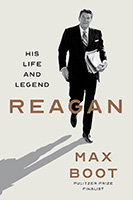 Reagan: His Life and Legend
Reagan: His Life and Legend
by Max Boot
(Liveright, 2024)
With its revelatory insights, Reagan: His Life and Legend is no apologia, depicting a man with a good-versus-evil worldview derived from his moralistic upbringing and Hollywood westerns. Providing fresh examinations of “trickle-down economics,” the Cold War’s end, the Iran-Contra affair, as well as a nuanced portrait of Reagan’s family, this definitive biography is as compelling a presidential biography as any in recent decades.


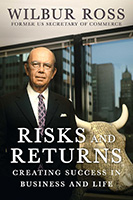 Risks and Returns: Creating Success in Business and Life
Risks and Returns: Creating Success in Business and Life
by Wilbur Ross
(Regnery, 2024)
Whether you’re interested in Ross’s experiences as a neighbor of John Lennon in the legendary Dakota apartment building, celebrating with Sir Richard Branson on his private island, or his tumultuous time in Washington, you will find Risks and Returns to be a candid reflection of a life lived at the pinnacle of Wall Street, New York, and Palm Beach society, and the Trump administration. Above all, anyone driven to find career success will learn from Ross’s life the strategies and mentality to achieve it.


 Henry V: The Astonishing Triumph of England's Greatest Warrior King
Henry V: The Astonishing Triumph of England's Greatest Warrior King
by Dan Jones
(Viking, 2024)
Henry V reigned over England for only nine years and four months and died at the age of just thirty-five, but he looms over the landscape of the late Middle Ages and beyond. The victor of Agincourt, he is remembered as the acme of kingship, a model to be closely imitated by his successors. William Shakespeare deployed Henry V as a study in youthful folly redirected to sober statesmanship. For one modern medievalist, Henry was, quite simply, “the greatest man who ever ruled England.”


 
Posted by Michael McKinney at 11:40 AM
Permalink
| Comments (0)
| Books
12.05.24

Leading Thoughts for December 5, 2024

IDEAS shared have the power to expand perspectives, change thinking, and move lives. Here are two ideas for the curious mind to engage with:
I.
Marshall Goldsmith on community:
“You may think of yourself as a wholly self-made rugged individualist who takes responsibility for choices made, never whines ‘It’s not fair!’ and always rejects the role of victim or martyr. I’ve met admirable people who embody all these traits, but one: None of them believes they are wholly self-made. They know that an earned life cannot be achieved in isolation. It only thrives within a community.”
Source: The Earned Life: Lose Regret, Choose Fulfillment
II.
Robert Littell on the shortest distance between two points:
“[The assumption] that the shortest distance between two points is a straight line, which you and I, old boy, in our infinite wisdom, know to be a dodgy proposition. Me, I am orthodox anti-Euclidean. There simply is no short distance between two points. There’s only a meander.”
Source: Character in The Company
* * *
Look for these ideas every Thursday on the Leading Blog. Find more ideas on the LeadingThoughts index.
* * *  Follow us on Instagram and X for additional leadership and personal development ideas.

 
Posted by Michael McKinney at 08:58 AM
Permalink
| Comments (0)
| Leading Thoughts
12.01.24

First Look: Leadership Books for December 2024
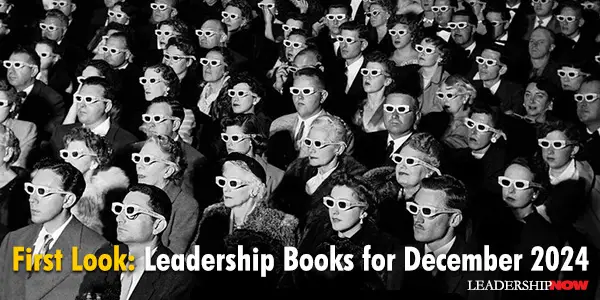
HERE'S A LOOK at some of the best leadership books to be released in December 2024 curated just for you. Be sure to check out the other great titles being offered this month.
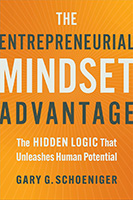 The Entrepreneurial Mindset Advantage: The Hidden Logic That Unleashes Human Potential by Gary G. Schoeniger The Entrepreneurial Mindset Advantage: The Hidden Logic That Unleashes Human Potential by Gary G. Schoeniger
In this groundbreaking book, internationally acclaimed author and entrepreneurial mindset expert Gary Schoeniger combines insights gleaned from hundreds of everyday entrepreneurs with cutting-edge research to create a practical how-to guide that not only shows us how to be more innovative and entrepreneurial in our own lives but also how to unlock the untapped entrepreneurial potential in others. Ultimately, The Entrepreneurial Mindset Advantage shows us how a subtle shift in our perspective can make a big difference in our lives. While this book will certainly benefit those who want to start a business, it looks beyond new venture creation to expose the entrepreneurial mindset as a teachable framework for thinking that has become essential for individuals and organizations to adapt and thrive in today's rapidly changing world.

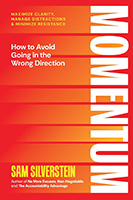 Momentum: How to Avoid Going in the Wrong Direction: Maximize Clarity, Manage Distractions, and Minimize Resistance by Sam Silverstein Momentum: How to Avoid Going in the Wrong Direction: Maximize Clarity, Manage Distractions, and Minimize Resistance by Sam Silverstein
Momentum is magnetic. People want to be with, work with, and build relationships with people who have momentum. But what is it, exactly? Renowned author, speaker, consultant, and coach Sam Silverstein has the surprising answer. Momentum is constant, conscious movement toward your goal that is in alignment with your purpose and mission. This goal is always connected with what we are called to do in the service of others. In his simple but powerful step-by-step strategy, Silverstein shows you how to identify what you should be acting on and create continuous progress on your goals and in your life. You will attract others to your mission, and you will create transformative influence in the events you encounter and the lives of the people around you.

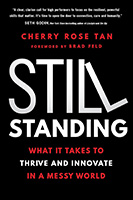 Still Standing: What It Takes to Thrive and Innovate in a Messy World by Cherry Rose Tan Still Standing: What It Takes to Thrive and Innovate in a Messy World by Cherry Rose Tan
In a world of disruption and uncertainty, Still Standing emerges as a beacon of resilience, offering the essential strategies for navigating the pressures of building and leading our organizations into the future. Still Standing is not just a book; it's a tactical roadmap for businesses and their leaders, who are determined to create everyday resilience in the face of constant change. Whether you're seeking to enhance your leadership skills, navigate the challenges of business, or manage workplace burnout and wellbeing, this book offers the insights and strategies needed to thrive and innovate in these uncertain times. Join Cherry Rose Tan in exploring the three capabilities that will empower you to not just survive, but flourish in the competitive world of business and innovation.

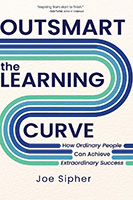 Outsmart the Learning Curve: How Ordinary People Can Achieve Extraordinary Success by Joe Sipher Outsmart the Learning Curve: How Ordinary People Can Achieve Extraordinary Success by Joe Sipher
Are you ready to transform your life and achieve extraordinary success? Outsmart the Learning Curve reveals the secrets of how ordinary people can overcome obstacles, acquire new skills rapidly, and reach their full potential. Whether you're a recent grad, a mid-career professional seeking change, or simply striving for continuous improvement, this book is your roadmap to personal and professional growth. Unlike many self-development books that focus on world-class performers, Outsmart the Learning Curve celebrates the growth and transformation of ordinary people, offering relatable inspiration and attainable strategies for readers from all walks of life. Outsmart the Learning Curve doesn't just tell you what to do—it shows you how to do it, with actionable advice on experiential learning, personality development, and overcoming self-doubt.

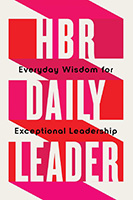 HBR Daily Leader: Everyday Wisdom for Exceptional Leadership by Harvard Business Review HBR Daily Leader: Everyday Wisdom for Exceptional Leadership by Harvard Business Review
HBR Daily Leader provides 365 days' worth of insights and inspiration, an easy and enjoyable way to make your professional development a regular habit. Every page offers something new, whether it's an insight to spark your thinking, a quote to inspire you, or a question to reflect on. And each day presents you with an opportunity to take on topics such as communicating effectively, managing your time, expanding your influence, and cultivating new skills. Elevate your leadership practice and presence with wisdom drawn from the best of Harvard Business Review.


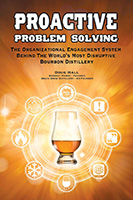  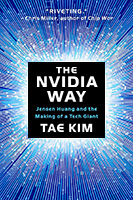 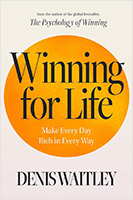

For bulk orders call 1-626-441-2024
* * *“You can't think well without writing well, and you can't write well without reading well. And I mean that last "well" in both senses. You have to be good at reading, and read good things.” — Paul Graham, Y Combinator co-founder
* * *  Follow us on Instagram and X for additional leadership and personal development ideas.

 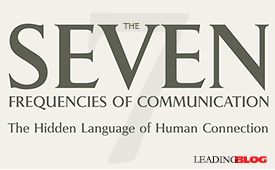
Posted by Michael McKinney at 09:15 AM
Permalink
| Comments (0)
| Books
|
 |
BUILD YOUR KNOWLEDGE
ADVERTISE WITH US





How to Do Your Start-Up Right
STRAIGHT TALK FOR START-UPS



Grow Your Leadership Skills
NEW AND UPCOMING LEADERSHIP BOOKS

Leadership Minute
BITE-SIZE CONCEPTS YOU CAN CHEW ON

Classic Leadership Books
BOOKS TO READ BEFORE YOU LEAD
|
 |
|







































